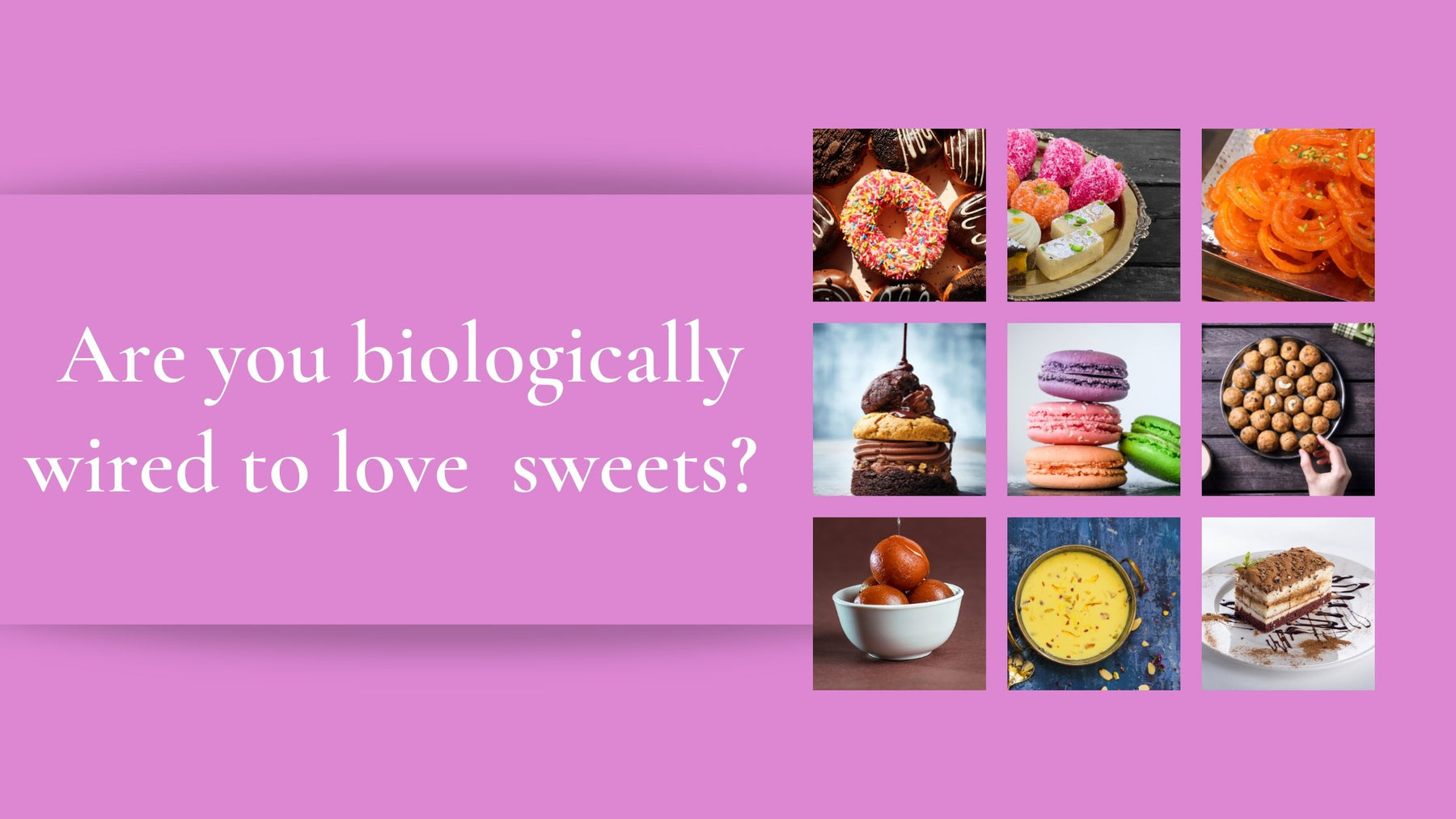
Are you biologically wired to love sweets?
Table Of Content
What's the science behind sugar addiction?
Every dietitian/ doctor and nutritionist has their own approach to eating right and everyone has something new to tell. Some cross their hearts that low- carb is the way while some promote a high- fat diet.
But if there is one thing almost every expert agree's on, it's to stay away from added sugar's.
Sugar consumption is suspected to play an important role in the pathogenesis of diabetes, cardiovascular disorders, fatty liver disease, and some forms of cancers. - Michael I. Goran.
From an evolutionary point of view, all humans (particularly during infancy) are born with an innate preference for sugar and sweeteners. This makes sense since human breast milk is sweet. As the child grown older, they need to have a sense to avoid bitter plants that can sometimes be poisonous. Sugar is also carbohydrate, which is brain food and bodies natural fuel source. Thus, kids are born with an innate preference of sweetness.
But we are far from the caves we used to live in once and don't really go plucking our fruits and flowers anymore.
Given the innate desire for sweet stuff and the addictive nature of sugar. It is easy to fall in the never ending hole of sugar consumption.
The more sugar you feed the body, the more it promotes the growth of inflammatory sugar loving bacteria. The stringer they grow, the louder their cries are heard in the form of craving.
Let’s discuss a few effects of sugar in the body:
-
Animal studies show that excess consumption of sugar has been associated with elevated stress hormones, anxiety and depression.
-
Sugar consumption before bed interferes with melatonin (sleep hormone) reduction and leads to a disturbed sleep.
-
Infants and pregnant women exposed to sugar’s and artificial sweeteners are at a higher risk of obesity. Watch the below for more:
Are artificial sweeteners or natural sweetners any better?
The short answer is no, but more on that some other day.
Actionable tip for the day:
Pull out the notes section on your phone right now and make a list of all the indirect/ direct way’s you consumed sugar. Look at the ingredient content if you ate anything packed.
Here is my list and honestly, I was surprised! I honestly though I have no added sugar’s in my diet.

Share your list with me by replying to this mail and I will suggest you alternatives to use.
Can you be addicted to sugar?
Sugar is present in many meals and beverages that people eat regularly. While a small amount of sugar is acceptable, we consume far more than is suggested. An average Indian consumes roughly 18 kilo's of sugar per year. Now sugar can be extremely toxic to the liver and produce non alcoholic fatty liver disease.
Because we are naturally drawn to sweet foods, it is easy for the occasional sweet or sugary drink to creep into our routine without our knowledge. As a result, we may depend on sugary foods and beverages, and some people may believe they have acquired an addiction.
In reality, while we may have formed difficult-to-break habits, there is little evidence that sugar is as addictive as smoking, alcohol, or other narcotics.
Sugar causes our body to release opioids and dopamine. The link between added sugar and addictive behaviour is as follows. Dopamine plays a crucial role in the neurotransmitter "reward circuit" linked to addictive behaviour. Your brain adjusts to release less dopamine as you repeat that behaviour more often. However, increasing the volume and frequency of the behaviour is the only way to attain the same "high" as before.
Eating sugar also boosts serotonin production, a chemical that makes us feel "good." Said, sugar creates chemical changes in the brain that make us feel good, and then we want more.
But that being said, you can re- wire your brain to reduce your addiction to sugar in only a few weeks.
How to curb sugar addiction?
If you're addicted to sugar, you want to stop it all at once. Sugar consumption is linked to the growth of inflammatory bacteria in the gut that only make you crave more sugar. The only way to stop from craving, is to get rid of the inflammatory gut bacteria by not giving them what they want to feed on.

I suggest my clients to start meals with a fruit first, this alone is enough as fruits are highly anti- inflammatory and naturally sweet, thus, curbs cravings.
How long does it take to kick sugar addiction?
The sweet stuff is all around us, from break-room doughnuts to healthy-looking packaged goods, and it's all too easy to indulge.
To reset your body, take a 21 sugar detox challenge. Simply put, no added sugars in your food. You might want to also look out for hidden sugars such as:
- Soda's/ diet drinks.
- Energy drinks.
- Protein powders/ protein bars.
- Jaggery/ honey/ maple syrup.
- Artificial sweeteners/ sugar- free sweeteners/ stevia.
- High fructose corn syrup.
- Dairy products (lactose, milk sugar, is also inflammatory to the gut).
It's crucial to realise that breaking unhealthy sugar habits implies avoiding sweets completely. You want to avoid sugars in all forms.
Instead include whole dates (not the syrup) and fruits as a treat between meals.
Most of my clients see a difference in how they feel within just a few weeks after switching to a whole- food diet. In no time, you will not reach out for sugar anymore and instead reach out for whole foods instead.
Let's Just Talk. No Obligations.
I do free consultations every Tuesday's and Thursday's. Either way you will get some actionable tips to reach your fitness goals faster.



Leave a comment